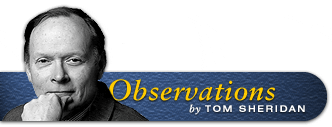 |
 |
|||||
 |
 |
 |
 |
 |
||

November 23, 2003 The magic of memory There are a couple of problems with Thanksgiving. The first is that we’ve allowed it to become—without raising too much of a protest—little more than a small pothole on the toll road between Halloween and Christmas. Shame on us. The second is that Thanksgiving is rooted, ultimately, neither in pilgrims nor pumpkin pie, but in memory. And as a society we don’t seem to have much tolerance for memory. We’re too focused on what’s around the next corner to appreciate what’s come and gone. Shame on us again. Some of that, I suppose, might be forgiven considering the frenetic pace of society today. We are, after all, bombarded with so much information, that events bound up from behind and run us over before we even know it. Faith, because it is inextricably linked to the past by memory, shares some of that problem with Thanksgiving. But faith also has to be firmly centered in the present and even looking ahead. Faith withers when it’s disconnected from the present. If we let that happen, shame on us yet again. All this is a way to lead up to a column about—you guessed it—Thanksgiving, faith and memory. I can’t get past mid-November without remembering where I was Nov. 22, 1963. That’s 40 years ago this year, a long time in the past, but an eyeblink in human memory. Every generation has at least one event that defines the era. For my parents, it was Pearl Harbor. For my children, it’s Sept. 11. For me, it was the assassination of President John F. Kennedy. That year, it cast a pall over Thanksgiving, and beyond. Everyone, it’s said, remembers where they were when they heard the news. I was working in a small and somewhat dingy office in Newark, N.J. The other staff members of the Catholic diocesan newspaper drifted slowly into an unused back room. I recall it was even dingier than the rest of the office. I was still a college student working there, but I followed mostly because I didn’t know what else to do. They prayed the rosary; I guess I did, too. I remember the days afterward, sitting in a greasy spoon restaurant across the street from the office. I ate lunch and watched the grainy black and white images march across the TV, images of a nation mourning at a time of the year when giving thanks would have been expected. I still can remember everything that paraded across that small TV screen: the quiet crowds, the riderless horse, boots backwards in the stirrups. That’s the problem with memory, turn it on and the scenes flood past. Memory changes us. Coming of age in the shadow of the Kennedy tragedy, I am a different person than I might have become. I suspect many of my generation are. But there are memories of other Thanksgivings that aren’t dreadful, but which are also life-changing. I recall several Thanksgivings when our children were smaller and we lived in a community full of people who—like us—were displaced, who didn’t have family nearby. It was a suburban town full of transferees, upwardly mobile families and with more than a smattering of older people whose children had themselves moved away to follow careers. We were alone. What did we do? We gathered for Thanksgiving dinner in the church basement. Young and old, childless and child-full, mincemeat pie people and pumpkin pie people. We sang and we talked and we shared and mostly we were thankful that, at that moment, we had each other. Those Thanksgivings, too, were life-changing events. Memory allows us to enrich the present by recalling the past. And to realize that the future hold opportunities. Memory also can give us the ability to slow down that headlong rush from Halloween to Christmas. It is a journey we can—and should—savor. Along with the turkey and dressing, that is. Front Page | Digest | Cardinal | Observations | Interview |